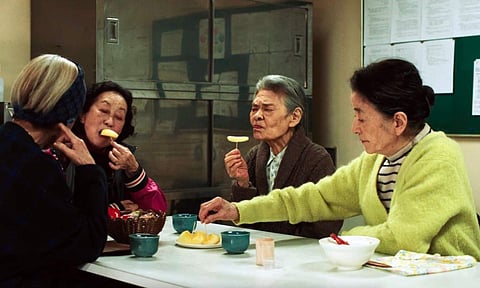

We often casually talk about the 70s as the new 60s and 60s as the new 50s in a jubilant acknowledgement of healthy years of seniority and greater life expectancy. However, “koureikashakai” or the ageing society, along with a low birth rate, has turned Japan into a nation with the oldest population in the world, creating societal and economic impasse of uncommon kinds.
Filmmaker Chie Hayakawa deploys this reality to envision a nightmarish Japan of the near future in her debut feature film Plan 75, a country in which the old would have to quit the scene entirely to make much-needed room for the young. With jobs, resources, and infrastructure running scarce and employment and the economy hitting rock bottom, the resentment against the aged is growing in the Japan of Hayakawa’s imagination. To correct the imbalance, the government introduces Plan 75, a policy where senior citizens are encouraged to opt for euthanasia in return for benefits like a sum of 100,000 yen for some self-indulgence before eternal rest.
What strikes initially about the film is the bizarreness of the scheme, heightened further by the impassive and robotic way it is peddled to the end users. But Hayakawa expertly lets the eeriness and chilling practicality of the arrangement make way for a more complex human exploration by turning the viewers into intimate witnesses of the lives of three individuals.
The characters and their relationships and predicaments force one to pause, reflect and ruminate on the human condition. There is Hiromu (Hayato Isomura), the cheerful young marketer of Plan 75, who gets conflicted when he finds his own estranged uncle opting for it. There’s the ageing single woman Michi (Chieko Baisho), rendered obsolete at work, her home up for demolition, finding it hard to get a new job, losing friends and finding her social circle shrinking. It makes her wonder if the plan would be better than the interminable struggles of life. Phone calls with her young Plan 75 assistant Yakao (Yuumi Kawai), who she is forbidden to meet, gets emotionally attached and reconsiders the decision to make way for a surreptitious rendezvous and something as mundane as a win at a bowling alley. And it makes her start seeing life in a new light.
Then there’s a caregiver Maria (Stefanie Arianne), who opts to work with the Plan 75 team for more money so she can better support the treatment of her sick daughter at home in the Philippines. Survival of one is rooted in the sacrifice of another.
The initial cynicism permeating the film gets turned on its head as it becomes a gentle, empathetic document. Hayakawa directs with restraint. Much has been written and spoken about the dark side of Japanese society and culture. The film might have emerged from that specific bleak space, but it addresses universal urban loneliness and disconnect. “Even when we have kids, it’s lonely... We are all alone in life,” says a childless Michi. Ironically, the group plan in Plan 75 involves cremating the policyholders together—community in death if not in life—to which a customer responds that once dead, it makes no difference whether you are with someone or not.
The biggest takeaway is Chieko Baisho’s stoic dignity and serene, pensive face that hides the many raging storms within her. Her battles with her own disposability took me back to an Indian film—Ivan Ayr’s Meel Patthar (Milestone). Though on a vastly different subject, it looked at the fear of redundancy with a similar poignant lens through a senior truck driver looking at his young apprentice with the fear of a takeover.
Plan 75 premiered in the Un Certain Regard section of the Cannes Film Festival, where it won a special mention. It went on to play at several festivals, including the Toronto International Film Festival and was Japan’s official entry for the Best International Feature Film Oscar. It should have made it to the shortlist.
I admire Plan 75 for how it is strikingly- poised on contradictions. A film about generational rifts gradually becomes all about a conversation between the young and the old. A film about loneliness eventually upholds sororities, associations, companionship, and community. A film that states that “death is coming for us all”, also underlines the fact that despite being ready to “kick-off,” you still can’t quite determine your final departure. A film that starts with the necessity of death becomes all about the triumph of life.
Plan 75 may not offer closures but it isn’t dismal or dispiriting. It is sensitive but never once sentimental or manipulative. A film on enforced death and dissolution could have rarely been more benign, tender, and sentient.